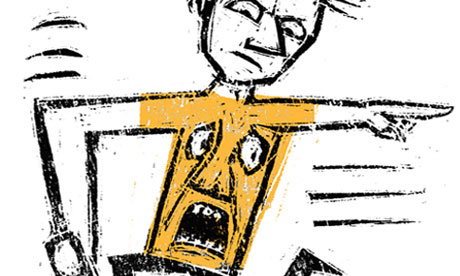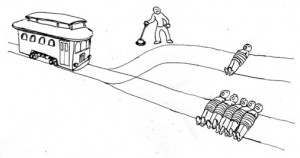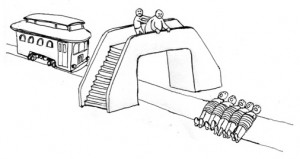updated 10/06/2017
This week saw yet another round of London tube strikes resulting in transport misery for thousands. More are planned next week and to boot there are Firefighter strikes this weekend.
As I set out mostly on foot these last couple of days I noticed both the short-tempered rudeness and hostility of some but even more so the many acts of random kindness of complete strangers that conveyed a deep sense of unselfish solidarity: we’re all in this together – we might just as well make it more tolerable for one another.
It all got me thinking about the crucial and complex link of altruism and resilience and how this connects up to disaster preparedness – say, when – perhaps because of a major incident – we all may have to grapple with the consequences of transport and supply disruptions on a very different scale for real.
Doing a bit of background reading what struck me immediately is the large amount of evidence that supports my humanistically inclined belief of “help others so that they in turn may help you for you cannot possibly do it all on your own”. To many this may sound rather counter intuitive. After all, simply picture a few survivors stranded on an island with limited resources – the toughest and fittest one survives, right? Well perhaps not but we may soon get some real insight and I for one can hardly wait to see Bear Gryll’s new series “The Island” that starts this Monday, 5th May on Channel 4 at 9pm.
In the meantime, however, let us be a little bit less dramatic and consider that survival is both short – and long-term and take a look at how…
Altruism moderates Life Stresses and predicts your Health Status
Altruism, also called social interest, is associated with better life adjustment, better marital adjustment and satisfaction, less hopelessness and depression overall. Being interested in and committed to wide social networks helps you to moderate stress to such an extent that it becomes a good predictor of your physical health status.
 MIT researchers Schwartz and colleagues who made these findings also think that the links between social interest, better mental resilience and reduced stress are in turn related to augmented self-confidence, an increased ability to be able to reframe one’s own experience and perceive greater meaning in life. Yet more evidence comes from the influential Hawaiian longitudinal study I mentioned in my earlier Nature-Nurture post which found that children who helped others in a meaningful way (i.e. assisting a family member, neighbour or some other community member) were the most likely to lead successful lives as adults. In short…
MIT researchers Schwartz and colleagues who made these findings also think that the links between social interest, better mental resilience and reduced stress are in turn related to augmented self-confidence, an increased ability to be able to reframe one’s own experience and perceive greater meaning in life. Yet more evidence comes from the influential Hawaiian longitudinal study I mentioned in my earlier Nature-Nurture post which found that children who helped others in a meaningful way (i.e. assisting a family member, neighbour or some other community member) were the most likely to lead successful lives as adults. In short…
Altruism is intrinsic, reciprocal, fosters Resilience – AND IT PAYS !
A large amount of scientific evidence from infant research, experimental psychology and ethology (study of animal behaviour) suggests that altruism has had an important influence on behaviour throughout history and has real survival value. Altruism represents an interesting and complex interaction of environmental and genetic influences – nature as well as nurture, a healthy dose of both. For example, research amongst some South American native tribes revealed that those individuals who produce and share more food than average are rewarded during times of hardship. This discovery led the well-known psychiatrist Yakov Shapiro to propose that this reciprocal altruism has many benefits and rewards:
- enhanced reputation and power – leading to
- greater status, esteem and influence within the community – resulting in
- privileged access to resources when the community faces catastrophic stress
Another author, Michael Shermer, further supports these evolutionary origins of our moral sense commenting that as a species of social primates we have evolved a deep sense of right and wrong. We reward reciprocity and cooperation and find ways to ‘punish’ selfishness and free riding. This emotional ‘barometer’ may be crucial and a hallmark of how resilient people wrestle with moral dilemmas. Importantly, resilient people are perhaps better able to make difficult moral decisions based on a more balanced approach of both reason and emotion.
Resilient people make more Balanced Decisions ~ What would YOU do?
The classic “runaway trolley” dilemma – Come and Have a Go !
If you can’t see the embedded video – here is the link to YouTube
Imagine yourself watching a runaway trolley roll down a track towards five strangers who would be killed if the trolley struck them. You have the ability to flip a switch and divert the trolley to another track where just one stranger is standing. If you flip the switch, one person will be killed instead of five. What would you do?
In Joshua Greene’s famous fMRI study most participants said that it was morally right to flip the switch.
Now imagine standing on a footbridge next to a stranger and that five people are trapped below in the path of the same oncoming runaway trolley. Pushing the stranger onto the track is the only way to save the other five people. What would you do? The end result of the two options are identical (one person dies and five survive) yet most of Greene’s participants said they would refuse to push the stranger. In terms of cognitive psychology, the second scenario involves far more emotional processing than the first which is shown in the fMRI scan by greater activation of the limbic brain regions – the same areas that activate during fear, another rather important aspect when considering resilience as discussed in my previous post “Understanding Fear”.
So, what has Moral Reasoning to do with Resilience? Choices are complex !
Choices in a real Emergency or Disaster situation more often than not involve dilemmas much tougher than the above trolley example. Sometimes there simply are no “right” or “better” choices; sometimes there are no good choices at all. Understandably, many a survivor is later haunted by memories and questions of “what else could I have done?” It is important to acknowledge that in some situations there may be no optimal moral choice and that resilience is simply retaining one’s sanity after the extreme hardship has passed. And that requires moral courage.
The Good News: you can learn Moral Reasoning and Moral Courage !
Gus Lee a former corporate whistle-blower and later US Senate ethics investigator writes in his book on Leadership: “…courage is not something with which we are born… courage is a learned quality, an acquirable set of skills, a practiced competence. It is like boxing except it is easier, smells better and causes fewer nosebleeds.”
Where do you begin learning Moral Courage? As easy as 1 – 2 – 3 and right at your doorstep
 The Guardian
The Guardian
First, following Rushworth Kidder’s three steps process, you must make an honest self-assessment. We all have core values and beliefs. What are they? Which are the most important? Are you living by these principles and values? Are you falling short and where? Are you motivated to change and can you do so?
Second, take all these points and discuss them with a highly principled person you admire. Such discussions can help you to recognize and analyse situations where your actions have moral implications. It also allows you to honestly and openly explore and evaluate the risks and dangers involved in defending your core values.
Third, practise your moral values and try to uphold them in challenging situations. Stay vigilant because it’s easy to relax your values, make compromises and take short cuts. By doing again and again what you know to be right and evaluating that against the reactions of the people that matter to you in your communities you will build a strong moral compass and moral courage.
This is nothing new really for Aristotle already wrote in his Nicomachean Ethics:
“We become just by doing just acts, temperate by doing temperate acts, brave by doing brave acts”
Practise makes Perfect – Simple! And where and when do we do all this? Where better than right at our doorstep in everyday life through many acts of random kindness aka altruism; hopefully reciprocal but one cannot always be greedy – besides, altruism and reciprocity work much better on a ‘grand’ scale when freed from simplistic one to one constraints. It all goes towards making our shared realities on planet earth just this much more tolerable no matter what modern life – and the forces of nature – throw at us.
“Be kind, for everyone you meet is fighting a hard battle.” Plato
Wishing you a happy Bank Holiday weekend full of Moral Courage and plenty of Altruism to continue building your ever increasing Resilience !
Monika
You might also be interested in the TED talk on altruism by Matthieu Ricard
Tweet
Thank you for sharing.
For more EVAQ8 blog simply use the right hand navigation. For emergency kits and practical resources use the top navigation. For FREE resources head over to our Preparedness Hub and find out why we use humour. If you like this post, please share it to help raise awareness for Emergency and Disaster Preparedness. Thank you!
Find EVAQ8 on social media, like and follow us!
References:
- Schwartz, C.E., Meisenhelder, J.B., Ma, Y., Reed, G. (2003) Altruistic social interest behaviors are associated with better mental health. Psychosomatic Medicine, 65, 778-785
- Kidder, R.M. (2006) Moral Courage. Harper Paperbacks
- Lee, G. (2007) Courage: The backbone of leadership. San Francisco, CA: Jossey-Bass
- Shapiro, Y. (1994) A reconsideration of altruism from an evolutionary and psyodynamic perspective. Ethics & Behaviour, 4 (1), 23-42
- Shermer, M. (2011) The Science of right and wrong. Scientific American, 304, Issue 1
- TED talks to restore your faith in humanity, playlist






